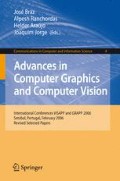Abstract
In this paper, a complete theory of steerable filters is presented which shows that quadrature filters are only a special case of steerable filters. Although there has been a large number of approaches dealing with the theory of steerable filters, none of these gives a complete theory with respect to the transformation groups which deform the filter kernel. Michaelis and Sommer (Michaelis and Sommer, 1995) and Hel-Or and Teo (Teo and Hel-Or, 1996; Teo and Hel-Or, 1998) were the first ones who gave a theoretical justification for steerability based on Lie group theory. But the approach of Michaelis and Sommer considers only Abelian Lie groups. Although the approach of Hel-Or and Teo considers all Lie groups, their method for generating the basis functions may fail as shown in this paper. We extend these steerable approaches to arbitrary Lie groups, like the important case of the rotation group SO(3) in three dimensions.
Quadrature filters serve for computing the local energy and local phase of a signal. Whereas for the one dimensional case quadrature filters are theoretically well founded, this is not the case for higher dimensional signal spaces. The monogenic signal (Felsberg and Sommer, 2001) based on the Riesz transformation has been shown to be a rotational invariant generalization of the analytic signal. A further generalization of the monogenic signal, the 2D rotational invariant quadrature filter (Köthe, 2003), has been shown to capture richer structures in images as the monogenic signal.
We present a generalization of the rotational invariant quadrature filter based on our steerable theory. Our approach includes the important case of 3D rotational invariant quadrature filters but it is not limited to any signal dimension and includes all transformation groups that own a unitary group representation.
Access this chapter
Tax calculation will be finalised at checkout
Purchases are for personal use only
Preview
Unable to display preview. Download preview PDF.
References
Bülow, T., Sommer, G.: Hypercomplex signals - a novel extension of the analytic signal to the multidimensional case. IEEE Transactions on Signal Processing 49(11), 2844–2852 (2001)
Danielsson, P.E.: Rotation-invariant linear operators with directional response. In: Miami, F.L. (ed.) Proc. Int. Conf. Pattern Recognition (1980)
Felsberg, M., Sommer, G.: The monogenic signal. IEEE Transactions on Signal Processing 49(12), 3136–3144 (2001)
Freeman, W., Adelson, E.: The design and use of steerable filters. IEEE Transactions on Pattern Analysis and Machine Intelligence 13(9), 891–906 (1991)
Granlund, G.H., Knutsson, H.: Signal processing for computer vision. Kluwer Academic Publishers, Dordrecht (1995)
Köthe, U.: Integrated edge and junction detection with the boundary tensor. In: Proc. of 9th International Conference on Computer Vision, Nice, France, vol. 1, pp. 424–431 (2003)
Michaelis, M., Sommer, G.: A Lie group approach to steerable filters. Pattern Recognition Letters 16, 1165–1174 (1995)
Perona, P.: Deformable kernels for early vision. IEEE Transactions on Pattern Analysis and Machine Intelligence 17(5), 488–499 (1995)
Simoncelli, E., Farid, H.: Steerable wedge filters for local orientation analysis. IEEE Transactions on Image Processing 5(9), 1377–1382 (1996)
Simoncelli, E.P., Freeman, W.T., Adelson, E.H., Heeger, D.J.: Shiftable multiscale transforms. IEEE Transactions on Information Theory 38(2), 587–607 (1992)
Teo, P., Hel-Or, Y.: A common framework for steerability, motion estimation and invariant feature detection. Technical Report STAN-CS-TN-96-28, Stanford University (1996)
Teo, P., Hel-Or, Y.: Lie generators for computing steerable functions. Pattern Recognition Letters 19(1), 7–17 (1998)
Wigner, E.: Group Theory and its Application to Quantum Mechanics of Atomic Spectra. Academic Press, London (1959)
Yu, W., Daniilidis, K., Sommer, G.: Approximate orientation steerability based on angular gaussians. IEEE Transactions on Image Processing 10(2), 193–205 (2001)
Author information
Authors and Affiliations
Editor information
Editors and Affiliations
Rights and permissions
Copyright information
© 2007 Springer-Verlag Berlin Heidelberg
About this paper
Cite this paper
Krajsek, K., Mester, R. (2007). A Unified Theory for Steerable and Quadrature Filters. In: Braz, J., Ranchordas, A., Araújo, H., Jorge, J. (eds) Advances in Computer Graphics and Computer Vision. Communications in Computer and Information Science, vol 4. Springer, Berlin, Heidelberg. https://doi.org/10.1007/978-3-540-75274-5_13
Download citation
DOI: https://doi.org/10.1007/978-3-540-75274-5_13
Publisher Name: Springer, Berlin, Heidelberg
Print ISBN: 978-3-540-75272-1
Online ISBN: 978-3-540-75274-5
eBook Packages: Computer ScienceComputer Science (R0)

